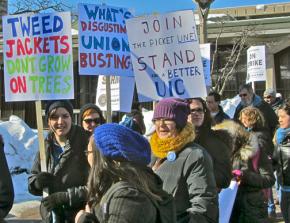UIC faculty teach a lesson about solidarity
UIC students and and report from the picket lines on a two-day strike that shut down their university.
AFTER THE administration dragged out negotiations for nearly two years and 65 bargaining sessions, more than 1,000 faculty at the University of Illinois at Chicago (UIC) went on a two-day strike to prove that they're tired of waiting around a fair contract.
The first-ever walkout by UIC United Faculty (UF) Union Local 6456--which represents tenured, non-tenured and adjunct faculty members--forced the cancellation of hundreds of classes on both February 18 and 19. But the huge campus just west of downtown was far from empty. Faculty members and their supporters kept up picket lines throughout the day, along with impromptu marches through campus.
One of the central issues for UF members is the union's demand for a minimum salary for non-tenured, full-time teachers. According to the union, at least 70 faculty who teach full time make less than $30,000 a year--which isn't that far above the poverty line for a family of four.
Lack of job security or opportunities for career advancement are also on the minds of faculty. According to UIC English professor Lennard Davis, writing at the Huffington Post, in the past five years, UIC has added 90 administrative positions, while eliminating 14 tenure lines.

In a letter to the 28,000 students on campus issued a week before the strike, UF explained why the faculty's demands about their teaching conditions are related to students' learning conditions:
-- The University of Illinois has accumulated over $275 million in unrestricted profits annually for the last four years, and is on track to do so again for the 2014 fiscal year. This profit margin is more typical of for-profit universities like the University of Phoenix.
Tuition has increased by 25 percent since 2007, while student enrollment is up by over 10 percent.
Over the last five years, administrators at UIC have increased by 10 percent, while tenured faculty positions have decreased by 1 percent.
We are fighting for many things of direct benefit to you: smaller class sizes, more individualized instruction, support for cutting-edge research, and classrooms and labs that are safe and well equipped.
Students responded to this and other appeals with strong support for the faculty. At least 100 students were on the picket line during the two-day strike, not only marching alongside faculty and graduate employees, but speaking out at the rallies. As Dana, an undergraduate student, who said she learned what the UF was fighting for while on the picket lines, told one rally, "I stand with my faculty because without them, this university would be nothing."
The main rally during the strike involved other groups of workers, too. Joe Iosbaker, representing another campus union, Service Employees International Union Local 73, talked about "the racism and classism that founded University of Illinois. Without the exploitation of Black labor here on UIC campus, the university would not have been able to grow."
ABOVE ALL, the two-day strike emphasized the concerns of faculty--and how their conditions have deteriorated at UIC, as at universities around the country. "Faculty strikes have been very rare in the last generation, but more faculty have been turning toward unions to regain their power as workers at the workplace," said an organizer from the American Federation of Teachers.
Lennard Davis wrote that he encountered "a great deal of excitement about a pushback from professors over what has come to be called 'the Walmartization' of the university system."
The issues facing faculty at UIC aren't unique--which is why messages of support came in from other campuses. From neighboring Indiana, faculty and students at Purdue University, Indiana University, Ball State University and others sent their solidarity, stating, "The key issues that shape your decision to strike--the terrible working conditions of adjunct lecturers, high student tuition rates compounded by wasting money on hiring more highly paid administrators--are issues that also affect us here in Indiana. This picture is only repeated on other campuses."
Mark Mattaini, an associate professor of social work at UIC, connected the struggle of faculty to the wider fight to defend public education, from K-12 through higher education:
Urban public universities are generally the only routes to the opportunities that higher education offers for most of the less privileged in our society. University priorities, however, are being set by the privileged, and are increasingly focused on preparing students and shaping their belief systems in ways that fit into a neoliberal capitalist society, in which the purpose of education is to support an unsustainable model of ever-expanding corporate growth.
By fighting for faculty of UIC, the UF is fighting to make public education accessible to all. That's a lesson that Chelsea Brown, a UIC anthropology undergraduate student, understands personally: "It's because of the strength and endurance of unions that I'm in the social position to even have access to higher education. The faculty of UIC work diligently to provide myself and my colleagues with an education meant to better our own lives and positions in the world."
The UIC faculty's struggle didn't end with the two-day strike. United Faculty is returning to negotiations on February 21. If the pressure from the walkout isn't enough to get the administration to negotiate, the union is prepared to step up its actions. Whatever it takes, however, UF members are standing strong. As Mark Mattaini put it: "The union needs to respond to power with power in a public way, and demonstrate that it has the power ultimately to disrupt the overall functioning of the university."


